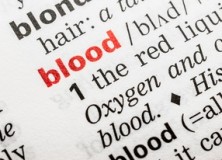Happy Friday! In light of Patient Blood Management Awareness Week last week, I thought I’d share some interesting and enlightening facts about blood that you probably didn’t know!
Please note that this article may not be for the faint of heart…
Did you know?
- The average man has 28,800,000,000,000 red blood cells and the average woman has 21,600,000,000,000 (that’s 2.4 trillion red blood cells per pint of blood)!
- Up until 2009 in Ireland, you would get a free pint of Guinness after donating blood to help replace the iron lost – a pint for a pint!
- It would take 2 million female mosquitoes, each sucking once, to completely drain the average human of blood (FYI: male mosquitoes are vegetarian)
- Every 2 seconds, someone is in need of blood and more than 5 million patients need blood transfusions each year in the US and Canada
- Your heart will pump nearly 179 million litres of blood during your lifetime – that’s enough to fill almost 72 Olympic-sized swimming pools!
- In Japan (and many other Asian countries), one’s blood type is believed to be an indicator of personality (in fact, the Japanese version of Facebook has a “Blood Type” option when setting up your profile)
- A newborn baby has nearly 1 cup of blood in his/her body
- Cows have about 800 blood types (and more are still being discovered)!
- It takes 20 to 60 seconds for a drop of blood to travel from the heart, through your body, and back to your heart again
- Our blood is red due to iron, but not all blood is red – crabs have blue blood, earthworms and leeches have green blood, and many invertebrates (starfish, insects) have clear or yellow blood
- Blood accounts for approximately 7% of a person’s weight
- There’s about 2 milligrams of gold in our bodies, most of which is in our blood
- The most common blood type in Canada is O Positive (about 39%) and the rarest blood type is AB Negative (about 1%)
Content and advice provided on The Iron Maiden is for information purposes only and should not serve as a substitute for a licensed health care provider, who is knowledgeable about an individual’s unique health care needs


